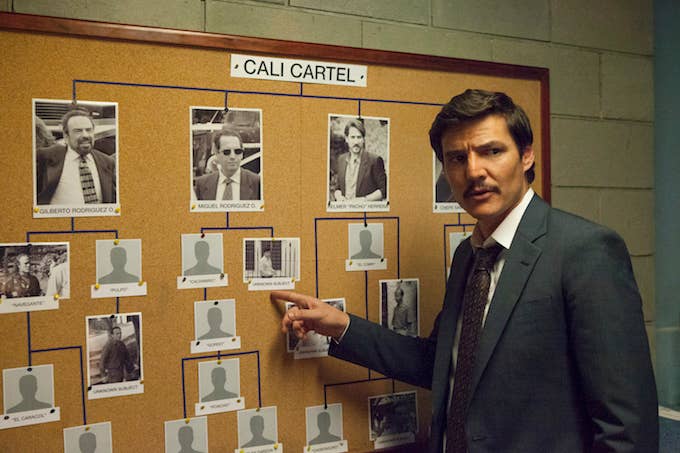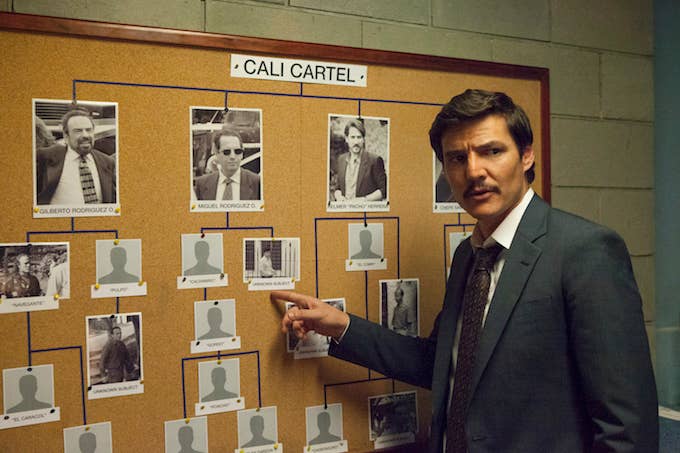
Last time we saw Pablo Escobar in Netflix’s Narcos, he was dead on a rooftop. The man who made the first two seasons of the cocaine trade drama so compelling had finally been brought to a bloody end. But the streaming service reupped Narcos for both seasons three and four, leaving everyone asking the same question: What is Narcos without Pablo Escobar?
While primarily a narcotrafficker and violent murderer, Pablo Escobar was also portrayed as a family man with political aspirations to uplift the poor people of Colombia in seasons one and two. He was a somehow-sympathetic everyman, who used crime for the good of the people and his family.
Without Escobar, Narcos knows that the new antagonists, the Cali cartel, don’t have the same Robin Hood story. There’s no social justice at play or redeeming storylines to be found. The Cali cartel just wants to make as much money as quickly as possible.
But Narcos also realizes that Escobar’s more honest tendencies never made the show compelling. It was the depths to which he would stoop to remain in power that made him such a captivating character, and his successors, the four Cali godfathers who call themselves “The Gentlemen of Cali,” are more than willing to stoop to those same depths.
It’s for that reason that Narcos is still worth watching. Doing whatever it takes to stay in power is not unique to one drug lord with one set of ambitions. The Cali cartel and the DEA’s hunt to bring them to justice creates that same freedom-at-all-costs tension that Pablo’s reign did, only this time the mechanisms of the cocaine trade have changed and so the DEA must change its tactics too.
In season three, the godfathers of Cali have transformed the cocaine trade into a professionalized industry, or as DEA Agent Javier Pena (Pedro Pascal) calls it, “a Fortune 500 company.” Where Escobar kept loose connections with other traffickers and addressed problems as they came up, the Cali godfathers keep meticulous notes on who to talk to, who to bribe, and how to avoid any unwanted attention. Unlike the Medellin cartel, when the operation is running well, the more violent sides of the drug business are conducted secretly and far from the authority’s eyes.
Following Pablo’s death, the Gentleman of Cali have slipped seamlessly into the number one role. Because they have paid off so many elected officials and police officers, they operate with relative immunity, as long as they keep a low profile. They are more or less able to stay out in the open, with the majority of the evidence against them hidden away in coded ledgers.
The Cali cartel is the pinnacle of efficiency, its corporate nature the most apparent difference in season three. There’s more search warrants and wiretapping in this season than there are raids and armed skirmishes (though there’s still plenty of the latter). Without Pablo, the show feels less like a manhunt and more like muckraking journalism.
There’s no Search Bloc in season three of Narcos. In order for Agent Pena and the DEA to catch the Cali cartel, they cannot go door-to-door, tearing Colombia apart, to find them. Instead, Pena must cultivate sources and dig through paperwork, picking his spots to attack the cartel at their weakest. Not only does Agent Pena have to catch the Cali godfathers, but he has to prove that they have committed a crime at all.
The tension of season three then arises not from the hunt to find the narcotraffickers as it did with Pablo, but from the knowledge that a single near miss could put an end to the entire operation against the Cali cartel. Their operation is so well-oiled and so impenetrable that the DEA hunt for them isn’t a matter of when like it was with Pablo, but a matter of if.
It was never Pablo Escobar himself that provided Narcos the high intensity, edge of your seat feeling. It was the hunt for him and what he would do to maintain the power that cocaine gave him during that chase. With the Cali Cartel, Narcos has kept the cocaine, transferred the power to new antagonists, and added a clock to the hunt, ratcheting up the tension past even what Pablo could bring.
For that reason, it’s important that season three does not dwell on the Cali Cartel’s long rise to the top as the first season did with Pablo, but instead it gives them total power immediately. The show doesn’t allow its audience a moment to rest and reset, but instead pushes them full force into the next stage of the drug war. Cali is king, but as maintaining their position on top becomes more tenuous, the godfathers begin using the same tactics as their predecessor, desperate to maintain their supremacy and way of life.
Superficially, the Cali godfathers don’t share Pablo’s motivations. They don’t want to help the poor of Colombia and they have no desire for political office. Even the way they treat their families differs, with Pablo’s decision making spurred by a desire to protect his wife, mother, and kids whereas many of the Cali cartel family members and loved ones are in on the business.
Without Pablo Escobar, Narcos is able to pick its spots more effectively. Much like the DEA raids on the Cali fathers, the violence is sparse enough that when it does occur, it can be more grotesque without audiences becoming desensitized. Narcos still finds the darkest parts of the human character without its original source material, only this time those impulses are neither justified nor tempered, but multiplied four times over.


